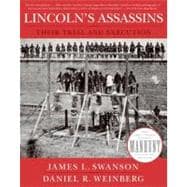
Note: Supplemental materials are not guaranteed with Rental or Used book purchases.
Purchase Benefits
The New copy of this book will include any supplemental materials advertised. Please check the title of the book to determine if it should include any access cards, study guides, lab manuals, CDs, etc.
The Used, Rental and eBook copies of this book are not guaranteed to include any supplemental materials. Typically, only the book itself is included. This is true even if the title states it includes any access cards, study guides, lab manuals, CDs, etc.
O powerful western fallen star!
O shades of night—O moody, tearful night!
—Walt Whitman
"When Lilacs Last in the Dooryard Bloom'd"
On April 14, 1865, the president of the United States went to the theater. Five days earlier Lee had surrendered to Grant. The Civil War was over and the North held a jubilee. Cannons boomed, People sang in the streets of Washington, and bonfires flamed. On April 14, Good Friday, Abraham Lincoln sought relief from the exhilaration of victory by attending the play Our American Cousin at Ford's Theatre.
The afternoon papers, the Evening Star and the Daily National Republican, published notices that General Grant would be Lincoln's theater guest that night. Grant had spent most of the war at the front and was an unfamiliar sight in the capital. The promise of his appearance guaranteed a full house. But then the Grants decided to leave Washington on an early train to visit their children. The Lincolns had trouble replacing them; several people declined their invitation. Finally, Clara Harris, daughter of U.S. Senator Ira Harris and her fiancé, Major Henry Rathbone, accepted the invitation.
When the curtain rose at 8:00 P.M., theatergoers who glanced up at the president's box were disappointed to find it empty. Perhaps Lincoln had changed his mind and was not coming. In fact, the president's carriage arrived late, at about 8:15. The Lincoln party entered Ford's, ascended the stairs, walked across the back of the theater, and stepped into their box, which was festooned with flags. The performance was suspended so that the orchestra could play "Hail to the Chief." As the audience cheered, the Lincolns took their seats.
During the performance, at about 10:15 P.M., a lone figure slipped into the box and fired a bullet into the back of the president's head. Simultaneously, several blocks away, a man forced his way into the home of Secretary of State William Seward and nearly stabbed him to death in his bed. At the theater, Lincoln slumped forward in his rocking chair. He lapsed into unconsciousness without uttering a sound. The assassin swung over the balustrade, ran across the stage, fled out a back door, and galloped away on a waiting horse. Several witnesses said the assassin looked just like John Wilkes Booth, the famous actor.
They were right. Booth, the twenty-six-year-old scion of America's most celebrated theatrical family, had just assassinated the president of the United States. One of the great actors of his day, Booth used his fame and wealth to support a conspiracy against Lincoln. A longtime Confederate sympathizer, he hated Lincoln and his polices. In 1864 he and his loosely organized band of followers plotted to kidnap the president and hold him hostage for the Confederacy. He scheme failed, the war ended, and the South lay in ruins. To avenge that defeat, Booth turned to assassination.
Surgeons at Ford's Theatre pronounced the president mortally wounded and warned that he could not be moved far. Soldiers carried him across the street to the Peterson house and laid him diagonally across a spindle bed that was too short for his tall frame. Mary Lincoln sobbed uncontrollably in the front parlor. At the back of the house, Secretary of War Edwin M. Stanton interviewed witnesses, sent telegrams to army posts, and commanded troops to hunt for the assassin. Abraham Lincoln lingered until morning, when he died at 7:22.
Lincoln's Assassins
Excerpted from Lincoln's Assassins: Their Trial and Execution by James L. Swanson, Daniel R. Weinberg
All rights reserved by the original copyright owners. Excerpts are provided for display purposes only and may not be reproduced, reprinted or distributed without the written permission of the publisher.